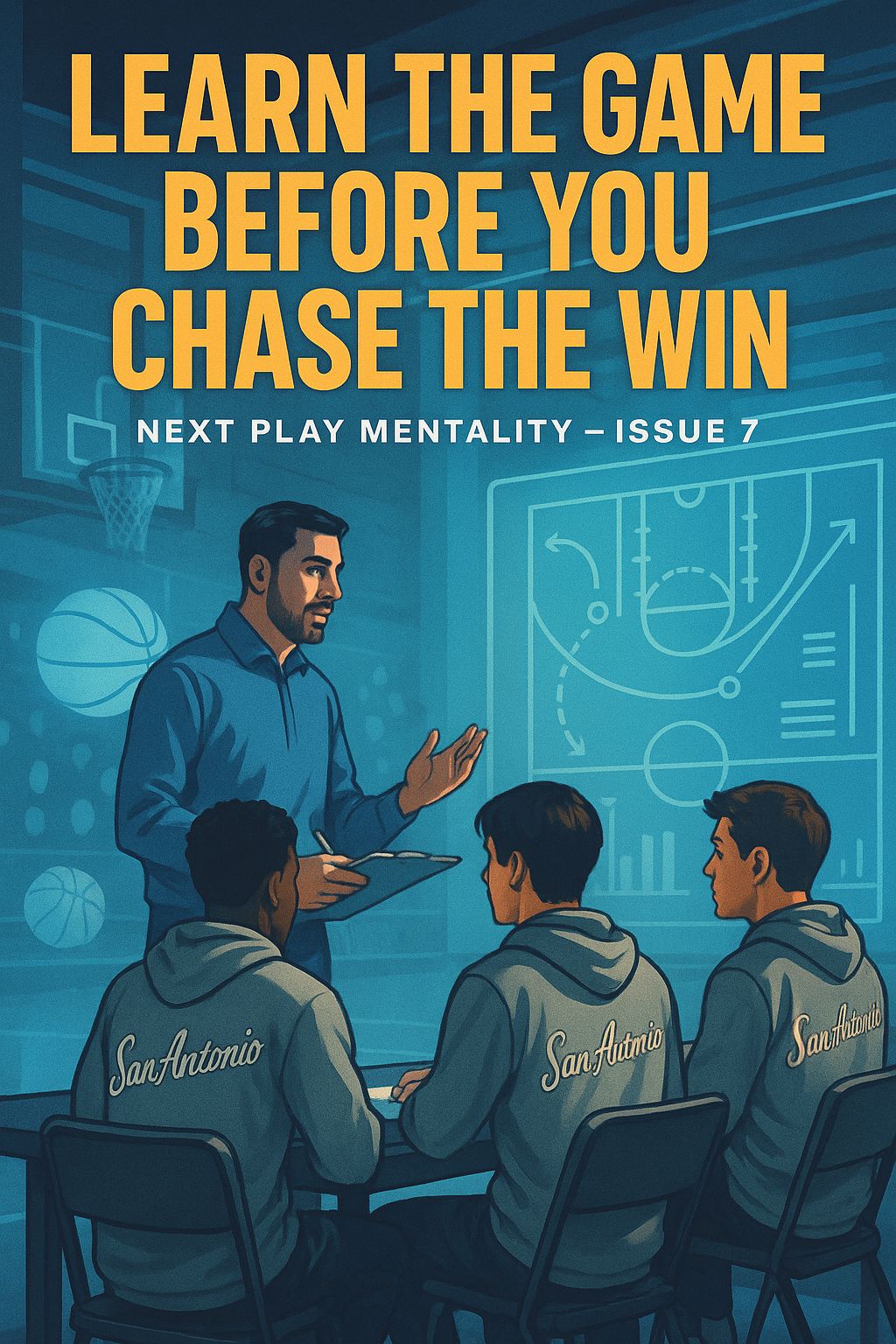- Next Play Mentality
- Posts
- LEARN THE GAME BEFORE YOU CHASE THE WIN
LEARN THE GAME BEFORE YOU CHASE THE WIN
Next Play Mentality Newsletter ISSUE 7

Next Play Mentality – Issue No. 7
“Learn the Game Before You Chase the Win”
Opening Message from Coach Jason
There’s a trap in youth basketball.
It whispers to kids early—win more, score more, dominate.
Parents fall into it. Coaches fall into it. And pretty soon, so do players.
But here’s the truth I wish every young hooper could hear:
You don’t get better by chasing wins. You get better by chasing understanding.
Before you ever worry about winning the game,
you better know how to read one.
Before you talk about leading a team,
you better know how to be led.
Before you flex your stats,
you better know what it means to sacrifice.
And before you try to chase a trophy,
you better learn what it means to play with trust.
Because without those things?
You’re just running around hoping the scoreboard saves your habits.
Coaching Principle / Personal Quote
“A mature player doesn’t just play hard—he plays aware.”
And if he’s not aware,
he’s not ready for the moments that matter.
Key Takeaway Section
Before You Chase Wins… Learn These 5 Things
How to Listen When It’s Not Your Turn
You can’t lead if you don’t follow.
Great players lock in when others speak—especially their coaches.How to Move Without the Ball
Most players disappear when they’re not dribbling.
Winners impact the game when no one’s watching.How to Respond to Mistakes
Shoulders drop. Eyes roll. Hands throw up.
Learn to own it, fix it, and move on—fast.How to Recognize the Real Opponent
It’s not the other team.
It’s your habits. Your fear. Your comfort zone.How to Compete Without Needing the Spotlight
If you only go hard when you’re getting attention,
you’re not built for high-level basketball.
You’re built for applause. That fades fast.
In-Game Scenario / Real-Life Moment
We were down by 8. Two minutes left.
I called a timeout and drew up a simple flare screen. Just needed spacing and timing.
But one of our guys—one of our most talented scorers—cut the wrong way. Twice.
Timeout again.
I pulled him aside and asked, “What did you see out there?”
He looked at me and said:
“Honestly? I wasn’t really looking at anything. I was just trying to make a play.”
That moment stuck with me.
He didn’t need more hustle.
He needed more understanding.
Because speed without awareness is just chaos.
And effort without intelligence doesn’t win close games.
Psychology Insight
Metacognition – “Thinking about your thinking.”
Emotional Regulation – “Staying composed and intentional under pressure.”
Players who develop metacognition aren’t just reacting—they’re reflecting.
They pause and process:
“What just happened?”
“Why did I do that?”
“What should I have seen instead?”
And I’ve seen this firsthand with one of my own.
All kids are different—and so are mine.
Some need to be told. Some need to feel it for themselves.
But Sebas? He’s always seen the game differently.
Yes, he’s been trained. But it stuck.
He prioritizes understanding.
He studies plays like puzzles and asks, “What was the read?”
That’s metacognition.
It’s not about being flashy—it’s about being intentional.
And he’s built to read before he reacts.
Then there’s Jaydon—different skillset.
Different wiring.
Jaydon’s strength is emotional regulation.
He stays even-keeled. Always.
Big moment? He wants the last shot.
Bad call? He lets it go.
(Well… like 93% of the time. Every now and then, that side-eye hits me like, “You saw that too, right?”)
Crowd loud? Game tight? Eyes on him?
He doesn’t get phased—because he’s trained his mind to stay in the moment.
Cool as the other side of the pillow.
Unless he gets called for a travel after a clean eurostep—then we might get a silent “c’mon, bruh” head shake.
But he resets. Quick. Always has.
Because when your emotions are steady, your decisions get sharper.
And players like Jaydon?
They bring calm to chaos.
I prioritized learning the game before winning—and that’s what I taught them.
Different styles. Different strengths.
Same foundation.
The mind wins games long before the scoreboard does.
Parent-Coach Connection
Parents—here’s what I’d ask of you:
Don’t measure your child’s progress by the scoreboard.
Ask them if they learned something new this week.
Ask if they supported a teammate.
Ask if they understood the game better today than yesterday.
Support their growth, not just their highlights.
You want your kid to win long-term?
Then help them love the process.
Because wins are temporary.
Understanding is forever.
Closing Message / Next Play Reminder
If you’re a player reading this, hear me clearly:
Don’t rush to win.
Don’t race to go viral.
Don’t overlook what the game is trying to teach you.
Master the fundamentals. Watch film. Ask questions. Study spacing.
Learn how to lose with your head up and learn how to win without losing yourself.
Because the most dangerous players aren’t the ones chasing stats.
They’re the ones who see the floor like a chessboard
and treat every possession like a lesson.
So the next time someone tells you to “just go out and get buckets,”
you look them in the eye and say—
“Nah. I’m here to understand the game.”
That’s Next Play Mentality.
Until then, keep embracing the next play.
— Coach Jason Garcia